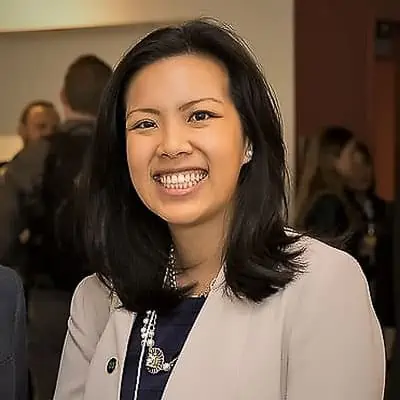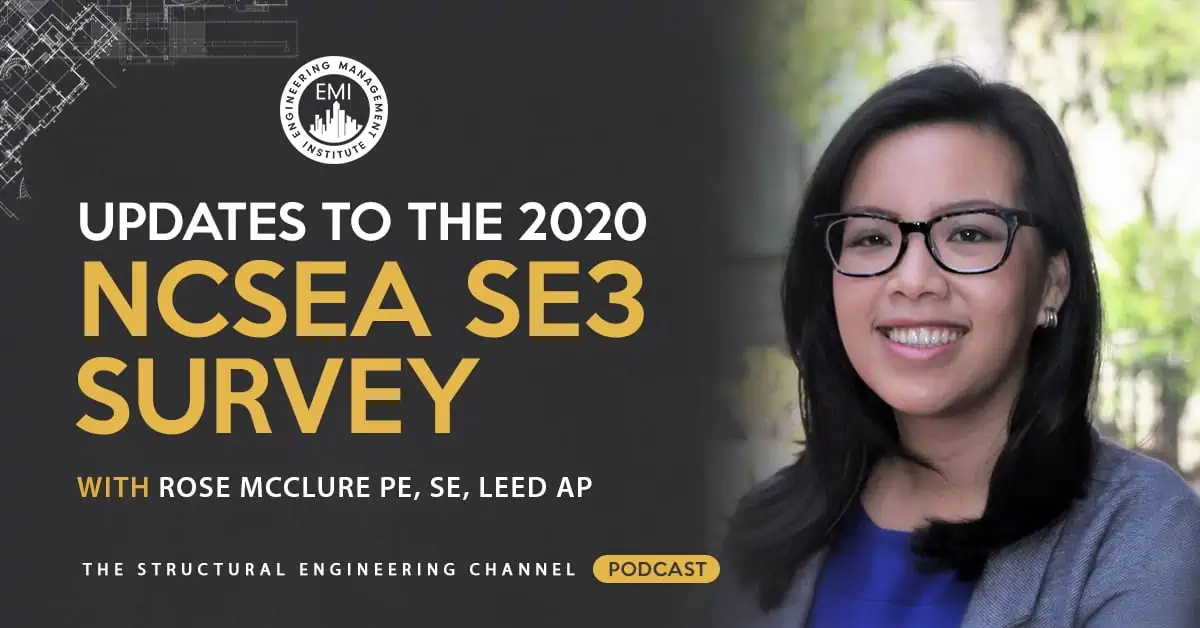Podcast: Play in new window | Download | Embed
In episode 26 of The Structural Engineering Channel, we talk to Rose McClure PE, SE, LEED AP, a senior consulting engineer at Simpson Gumpertz & Heger Inc. Rose talks about SE3, an NCSEA Committee that works to improve engagement and retention of structural engineers. She provides us with the latest updates on the SE3 2020 survey, the state of engagement and equity in the SE profession, and the future of the profession from the perspective of a younger engineer.
Engineering Quotes:
Here Are Some of the Questions We Ask Rose McClure in This Episode:
- Can you tell us about what you do daily in your job at Simpson Grumpertz & Heger?
- For those who have not heard of the SE3 project before, could you please give a brief explanation of what it is?
- What is the area of the 2020 study of the SE3 committee that is called the aspiration gap?
- What do you think this pandemic means for the long-term acceptability of working remotely in the structural engineering industry?
- Now that everyone is working remotely, do you think it will improve the overall perception of working from home?
- How do you see there being a need for different levels of family care, how are these benefits going to be needed in the future, and what will the implications be for diversity in technical industries like structural engineering?
- Have you seen any specific trends resulting in people leaving structural engineering and how serious of a problem is it becoming?
- Is there an internal exchange program within a group where young engineers swap their positions with someone else to get broader experience?
- SE3 is sometimes considered a women’s initiative. Is this true?
- Can you tell us what some of the benefits and opportunities are for engineers to sit on the SE3 committee?
- Based on the SE3 survey, what are some of the biggest challenges that structural engineering is facing today?
Here Are Some of the Key Points Discussed About the 2020 NCSEA SE3 Survey:
- SE3 stands for Structural Engineering Engagement in Equity and is a committee of the NCSEA. They work to improve engagement, retention diversity, and inclusion.
- The aspiration gap is the study of the desire of anyone in the structural engineering profession to become a principal or a project manager at any given level.
- There are already long-term implications in terms of working from home. Over 70% of professionals who are working from home say they have never worked remotely before. It is staggering to see what professionals have had to go through in terms of transitioning to working remotely.
- Another implication is calling in the role of childcare and how to balance work with family.
- Younger generations who are currently practicing structural engineering and are currently caring for children tend to value co-parenting with equal distribution of responsibilities at home.
- One-on-one mentorship is difficult to replace with virtual mentorship, especially when you don’t have the proper feeling of working with a team.
- Internal exchange programs have been informally in the works for a long time in many businesses and firms. This is a good way to expose young engineers to different roles and experiences within the company or firm.
Some of the biggest challenges for structural engineers are:
-
- Recruiting and retention
- Monetization of services
- Inadequate compensation relative to other professions
- Use of evolving technology
- SE3 is thought of as a women’s initiative more often than it is not, and they do try to battle against this assumption very often. They are a committee for inspired professionals who are interested in securing the future of structural engineers.
- One of the primary objectives of the SE3 committee is to administer the survey of SE perfection. What they are trying to understand is if people aspire to become a principal within their firms or whether they aspire to different roles in any given company.
- The primary reason why people do not want to become a principal is due to having other priorities in their lives.
- The SE3 is working on finding out more about engagement and retention in these times, and they know how important it is for companies to keep on surviving through them. For the incoming generations, they must work in a place that values work/life balance and the culture of the company.
More Details in This Episode…
About Rose McClure PE, SE, LEED AP

Rose believes strongly in engagement, teaching, and mentorship. Through clear communication and effective team building, she brings a collaborative approach to all her projects. Having worked in New York, North Carolina, California, and now Illinois, she has a unique perspective on the state of practice within the industry and brings this knowledge to ongoing efforts regarding engineering engagement and equity.
Active within the SE community through NCSEA and ASCE/SEI, Rose is chair of the NCSEA Structural Engineering Engagement and Equity Committee, a member of the SEAOI Continuing Education and WISE Committees, and a member of the SEI Public Relations Committee.
Sources/References:
Connect with Rose McClure
Simpson Gumpertz & Heger
SE3
TSEC 11: The Structural Engineering Engagement and Equity (SE3) Project
NCSEA
SEI MEMBERSHIP
Stephanie Espy – MathSP Founder and CEO
MathSP
Engineering Management Institute YouTube Channel
Please leave your comments or questions in the section below on the 2020 NCSEA SE3 Survey.
To your success,
Mathew Picardal P.E. & Alexis Clark, P.E., M.ASCE
Hosts of The Structural Engineering Channel







